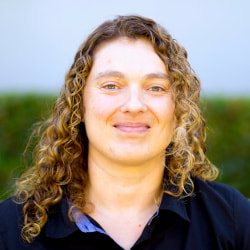Nguyen is specializing in Teaching, Learning, and Educational Improvement. Her research interests include design of STEM learning experiences and multimodal assessment to study collaboration and conceptual understanding. She is advised by Warschauer and Professor Rossella Santagata.
Garcia is specializing in Teaching, Learning and Education Improvement. Her research interests lie in the intersection of design theory, critical theory, and learning sciences with a focus on STEM K-12 education. She is advised by Warschauer and Associate Professor June Ahn. Richardson’s research over most of her career has been in software engineering. Currently, she is working on broadening participation in computing, largely through expansion of quality, relevant K-16 computer science education, with the explicit purpose of reaching students of underserved groups. Warschauer"s research foci include digital learning, language and literacy, STEM, and learning analytics. As director of the Digital Learning Lab at UC Irvine, he guides a range of research projects related to digital media in education. Abstract Central to the theory of learning are inquiry-based approaches to education. Whereas there is a plethora of research on inquiry learning in the domain of science, few studies have analyzed how inquiry-based learning can be applied to computer science education, and how different approaches to inquiry may benefit diverse learners. This is one of the first studies to analyze teacher enactment of inquiry-based learning during the implementation of an upper elementary, computational thinking curriculum, and to explore how teacher approaches to inquiry appear to support or constrain multilingual students' development of computational thinking and computer science identities. Design-based research was used to iteratively develop, test, and refine the inquiry-based curriculum, which aligns with computer science and literacy standards, provides linguistic scaffolding, and integrates culturally responsive materials. We adopt a cross-case mixed-methods design to collect data from five teachers and 149 students including detailed field notes, teacher interviews, student computational artifacts, and student identity surveys. Through analyses of teacher moves, we find that teachers adopt different approaches to inquiry that can be indexed along a continuum ranging from open to closed. Patterns in student data revealed that those who received more structured inquiry lessons developed more sophisticated computational artifacts and showed greater identification with the field of computer science. Findings from this study are being used to add more structured inquiry approaches to the next iteration of our curriculum, including integrating USE/MODIFY/CREATE models into lessons and applying metacognitive strategies from reading research to students' programming activities. Comments are closed.
|
Resources for:
|
|


